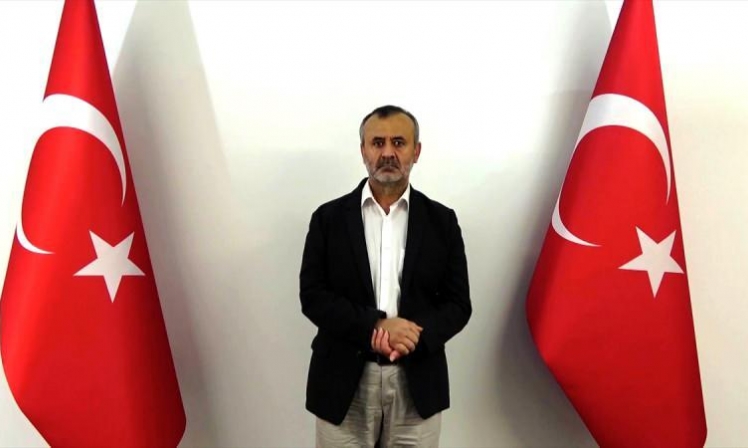A report drafted by a bar association in Turkey has revealed how a Turkish educator renditioned to Turkey from Kyrgyzstan by Turkish intelligence in 2021 due to his links to a faith-based group recounted instances of torture and death threats he was subjected to in custody, the Kronos news website reported.
Orhan İnandı, the founder and director of the prestigious Sapat school network operating in Kyrgyzstan, went missing at the end of May 2021 in Bishkek and was found in detention at the Ankara Police Department in early July. He was abducted due to his links to the Gülen movement by Turkey’s National Intelligence Organization (MİT), which has been involved in unlawfully transferring people to Turkey from countries around the world.
Photos of İnandı in police custody in handcuffs with Turkish flags prompted allegations of torture at the time due to İnandı’s visible weight loss and swollen right hand.
The Gülen movement, a faith-based group inspired by Muslim cleric Fethullah Gülen, is labelled as a terrorist organization by the Turkish government and accused of masterminding a failed coup in Turkey in July 2016. Both Gülen and his followers strongly deny any involvement in the abortive putsch or any terrorist activity.
Turkish President Recep Tayyip Erdoğan had acknowledged in a statement in July 2021 that İnandı was actually abducted by MİT, lauding the Turkish spies’ efforts in the rendition.
An indictment drafted by the Ankara Chief Public Prosecutor’s Office in July 2021 charged İnandı with “managing an armed terrorist organization” and sought a prison sentence of up to 22 years. The Ankara 3rd High Criminal Court gave him a prison sentence of 21 years in June 2023.
At the first hearing of his trial in November 2021, İnandı said he was subjected to torture for 37 days.

Kronos on Thursday revealed the details of the “Forced Disappearance Monitoring Report,” drafted by the human rights committee of the Ankara Bar Association but blocked from publication by the bar association’s management for unknown reasons. The report is based on İnandı’s account of the torture he endured during abduction and while in custody.
According to İnandı, he was abducted by three people, including two Kyrgyz nationals, and forced into a car. They changed vehicles twice and he was taken to the border of either Uzbekistan or Tajikistan. During the ordeal, the teacher, whose arm was broken as a result of beatings, was blindfolded and also given sleeping pills. İnandı bases his estimates on what he saw from a small gap in the blindfold.
The teacher said he was brought to Turkey in a private jet and was beaten during the journey. He added that two people wearing ski masks took him to the toilet of the plane and recorded him on video while he stated his name and where he came from.
After getting off the plane, İnandı was put into a car and stripped down to his underwear. Then he was taken to a three-square-meter room with walls covered by sound-resistant material. There was a microphone and camera on the ceiling. Given new clothes, the teacher was subjected to further beating in this room, according to the report.
İnandı said he was given bread, cheese and olives twice a day for meals and was taken to the toilet three times a day. He added that he was not allowed to use the toilet when needed and was forcibly fed if he refused to eat the meal provided.
The report said İnandı was taken blindfolded to a doctor for an X-ray of his arm after spending four or five days in this room.
İnandı described another room where he was taken for interrogation as follows: “There was a table in the middle, with handcuffs, a baton and an electric device on top of it. Behind the table, leather chairs were leaning against the wall.”
The teacher said that a man talked to him before others interrogated him and said: “We are the state. We can kill you. So, you will tell us everything.”
İnandı said he was frequently beaten throughout the interrogations, stripped two or three times, threatened with harm to his daughter once and given electric shocks to his leg once.
According to the report, the teacher was offered a chance to spy on followers of the Gülen movement and was asked about the administrators he knew in Kyrgyzstan, the movement’s organization in the country and what he knew about the July 15 coup attempt.
In addition, İnandı was asked about the Gülen movement’s alleged connection to several unsolved murders and whether opposition politicians Meral Akşener and Ali Babacan had any ties to the movement.
Since the coup attempt in July 2016 the Erdoğan government has employed extra-legal methods to secure the return of its critics after its official extradition requests have been denied. The government’s campaign has mostly relied on renditions, in which the government and its intelligence agency MİT persuade the relevant states to hand over individuals without due process. The victims have been the subjects of a number of human rights violations including arbitrary arrests, house raids, torture and ill-treatment during these operations. A detailed account of the Erdoğan government’s transnational repression can be found in a report by the Stockholm Center for Freedom titled “Turkey’s Transnational Repression: Abduction, Rendition and Forcible Return of Erdoğan Critics.”
In several of these cases, the UN Working Group on Arbitrary Detention (WGAD) concluded that the arrest, detention and forced transfer to Turkey of Turkish nationals were arbitrary and in violation of international human rights norms and standards.

